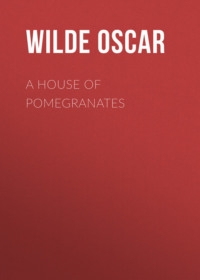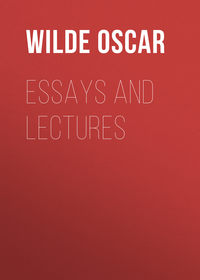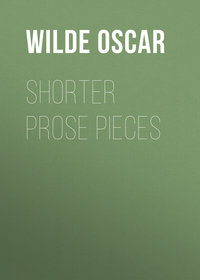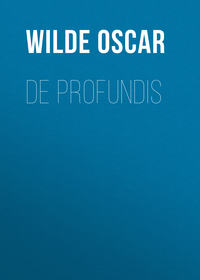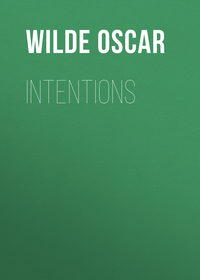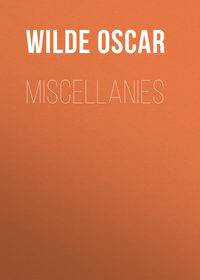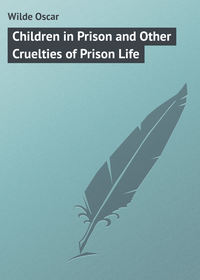 полная версия
полная версияReviews
(1) ’Twixt Love and Duty: A Novel. By Tighe Hopkins. (Chatto and Windus.)
(2) Jenny Jennet: A Tale Without a Murder. By A. Gallenga. (Chapman and Hall.)
(3) A Life’s Mistake: A Novel. By Mrs. H. Lovett Cameron. (Ward and Downey.)
(4) J. S.; or, Trivialities: A Novel. By Edward Oliver Pleydell-Bouverie. (Griffith, Farren and Co.)
(5) All But: A Chronicle of Laxenford Life. By Pen Oliver, F.R.C.S. (Kegan Paul.)
A LITERARY PILGRIM
(Pall Mall Gazette, April 17, 1886.)
Antiquarian books, as a rule, are extremely dull reading. They give us facts without form, science without style, and learning without life. An exception, however, must be made for M. Gaston Boissier’s Promenades Archéologiques. M. Boissier is a most pleasant and picturesque writer, and is really able to give his readers useful information without ever boring them, an accomplishment which is entirely unknown in Germany, and in England is extremely rare.
The first essay in his book is on the probable site of Horace’s country-house, a subject that has interested many scholars from the Renaissance down to our own day. M. Boissier, following the investigations of Signor Rosa, places it on a little hill over-looking the Licenza, and his theory has a great deal to recommend it. The plough still turns up on the spot the bricks and tiles of an old Roman villa; a spring of clear water, like that of which the poet so often sang, ‘breaks babbling from the hollow rock,’ and is still called by the peasants Fonte dell’ Oratini, some faint echo possibly of the singer’s name; the view from the hill is just what is described in the epistles, ‘Continui montes nisi dissocientur opaca valle’; hard by is the site of the ruined temple of Vacuna, where Horace tells us he wrote one of his poems, and the local rustics still go to Varia (Vicovaro) on market days as they used to do when the graceful Roman lyrist sauntered through his vines and played at being a country gentleman.
M. Boissier, however, is not content merely with identifying the poet’s house; he also warmly defends him from the charge that has been brought against him of servility in accepting it. He points out that it was only after the invention of printing that literature became a money-making profession, and that, as there was no copyright law at Rome to prevent books being pirated, patrons had to take the place that publishers hold, or should hold, nowadays. The Roman patron, in fact, kept the Roman poet alive, and we fancy that many of our modern bards rather regret the old system. Better, surely, the humiliation of the sportula than the indignity of a bill for printing! Better to accept a country-house as a gift than to be in debt to one’s landlady! On the whole, the patron was an excellent institution, if not for poetry at least for the poets; and though he had to be propitiated by panegyrics, still are we not told by our most shining lights that the subject is of no importance in a work of art? M. Boissier need not apologise for Horace: every poet longs for a Mæcenas.
An essay on the Etruscan tombs at Corneto follows, and the remainder of the volume is taken up by a most fascinating article called Le Pays de l’Enéide. M. Boissier claims for Virgil’s descriptions of scenery an absolute fidelity of detail. ‘Les poètes anciens,’ he says, ‘ont le goût de la précision et de la fidélité: ils n’imaginent guère de paysages en l’air,’ and with this view he visited every place in Italy and Sicily that Virgil has mentioned. Sometimes, it is true, modern civilisation, or modern barbarism, has completely altered the aspect of the scene; the ‘desolate shore of Drepanum,’ for instance (‘Drepani illætabilis ora’) is now covered with thriving manufactories and stucco villas, and the ‘bird-haunted forest’ through which the Tiber flowed into the sea has long ago disappeared. Still, on the whole, the general character of the Italian landscape is unchanged, and M. Boissier’s researches show very clearly how personal and how vivid were Virgil’s impressions of nature. The subject is, of course, a most interesting one, and those who love to make pilgrimages without stirring from home cannot do better than spend three shillings on the French Academician’s Promenades Archéologiques.
Nouvelles Promenades Archéologiques, Horace et Virgile. By Gaston Boissier. (Hachette.)
BÉRANGER IN ENGLAND
(Pall Mall Gazette, April 21, 1886.)
A philosophic politician once remarked that the best possible form of government is an absolute monarchy tempered by street ballads. Without at all agreeing with this aphorism we still cannot but regret that the new democracy does not use poetry as a means for the expression of political opinion. The Socialists, it is true, have been heard singing the later poems of Mr. William Morris, but the street ballad is really dead in England. The fact is that most modern poetry is so artificial in its form, so individual in its essence and so literary in its style, that the people as a body are little moved by it, and when they have grievances against the capitalist or the aristocrat they prefer strikes to sonnets and rioting to rondels.
Possibly, Mr. William Toynbee’s pleasant little volume of translations from Béranger may be the herald of a new school. Béranger had all the qualifications for a popular poet. He wrote to be sung more than to be read; he preferred the Pont Neuf to Parnassus; he was patriotic as well as romantic, and humorous as well as humane. Translations of poetry as a rule are merely misrepresentations, but the muse of Béranger is so simple and naïve that she can wear our English dress with ease and grace, and Mr. Toynbee has kept much of the mirth and music of the original. Here and there, undoubtedly, the translation could be improved upon; ‘rapiers’ for instance is an abominable rhyme to ‘forefathers’; ‘the hated arms of Albion’ in the same poem is a very feeble rendering of ‘le léopard de l’Anglais,’ and such a verse as
’Mid France’s miracles of art,Rare trophies won from art’s own land,I’ve lived to see with burning heartThe fog-bred poor triumphant stand,reproduces very inadequately the charm of the original:
Dans nos palais, où, près de la victoire,Brillaient les arts, doux fruits des beaux climats,J’ai vu du Nord les peuplades sans gloire,De leurs manteaux secouer les frîmas.On the whole, however, Mr. Toynbee’s work is good; Les Champs, for example, is very well translated, and so are the two delightful poems Rosette and Ma République; and there is a good deal of spirit in Le Marquis de Carabas:
Whom have we here in conqueror’s rôle?Our grand old Marquis, bless his soul!Whose grand old charger (mark his bone!)Has borne him back to claim his own.Note, if you please, the grand old styleIn which he nears his grand old pile;With what an air of grand old stateHe waves that blade immaculate!Hats off, hats off, for my lord to pass,The grand old Marquis of Carabas! —though ‘that blade immaculate’ has hardly got the sting of ‘un sabre innocent’; and in the fourth verse of the same poem, ‘Marquise, you’ll have the bed-chamber’ does not very clearly convey the sense of the line ‘La Marquise a le tabouret.’ The best translation in the book is The Court Suit (L’Habit de Cour), and if Mr. Toynbee will give us some more work as clever as this we shall be glad to see a second volume from his pen. Béranger is not nearly well enough known in England, and though it is always better to read a poet in the original, still translations have their value as echoes have their music.
A Selection from the Songs of De Béranger in English Verse. By William Toynbee. (Kegan Paul.)
THE POETRY OF THE PEOPLE
(Pall Mall Gazette, May 13, 1886.)
The Countess Martinengo deserves well of all poets, peasants and publishers. Folklore is so often treated nowadays merely from the point of view of the comparative mythologist, that it is really delightful to come across a book that deals with the subject simply as literature. For the Folk-tale is the father of all fiction as the Folk-song is the mother of all poetry; and in the games, the tales and the ballads of primitive people it is easy to see the germs of such perfected forms of art as the drama, the novel and the epic. It is, of course, true that the highest expression of life is to be found not in the popular songs, however poetical, of any nation, but in the great masterpieces of self-conscious Art; yet it is pleasant sometimes to leave the summit of Parnassus to look at the wild-flowers in the valley, and to turn from the lyre of Apollo to listen to the reed of Pan. We can still listen to it. To this day, the vineyard dressers of Calabria will mock the passer-by with satirical verses as they used to do in the old pagan days, and the peasants of the olive woods of Provence answer each other in amœbæan strains. The Sicilian shepherd has not yet thrown his pipe aside, and the children of modern Greece sing the swallow-song through the villages in spring-time, though Theognis is more than two thousand years dead. Nor is this popular poetry merely the rhythmic expression of joy and sorrow; it is in the highest degree imaginative; and taking its inspiration directly from nature it abounds in realistic metaphor and in picturesque and fantastic imagery. It must, of course, be admitted that there is a conventionality of nature as there is a conventionality of art, and that certain forms of utterance are apt to become stereotyped by too constant use; yet, on the whole, it is impossible not to recognise in the Folk-songs that the Countess Martinengo has brought together one strong dominant note of fervent and flawless sincerity. Indeed, it is only in the more terrible dramas of the Elizabethan age that we can find any parallel to the Corsican voceri with their shrill intensity of passion, their awful frenzies of grief and hate. And yet, ardent as the feeling is, the form is nearly always beautiful. Now and then, in the poems of the extreme South one meets with a curious crudity of realism, but, as a rule, the sense of beauty prevails.
Some of the Folk-poems in this book have all the lightness and loveliness of lyrics, all of them have that sweet simplicity of pure song by which mirth finds its own melody and mourning its own music, and even where there are conceits of thought and expression they are conceits born of fancy not of affectation. Herrick himself might have envied that wonderful love-song of Provence:
If thou wilt be the falling dewAnd fall on me alway,Then I will be the white, white roseOn yonder thorny spray.If thou wilt be the white, white roseOn yonder thorny spray,Then I will be the honey-beeAnd kiss thee all the day.If thou wilt be the honey-beeAnd kiss me all the day,Then I will be in yonder heavenThe star of brightest ray.If thou wilt be in yonder heavenThe star of brightest ray,Then I will be the dawn, and weShall meet at break of day.How charming also is this lullaby by which the Corsican mother sings her babe to sleep!
Gold and pearls my vessel lade,Silk and cloth the cargo be,All the sails are of brocadeComing from beyond the sea;And the helm of finest gold,Made a wonder to behold.Fast awhile in slumber lie;Sleep, my child, and hushaby.After you were born full soon,You were christened all aright;Godmother she was the moon,Godfather the sun so bright.All the stars in heaven toldWore their necklaces of gold.Fast awhile in slumber lie;Sleep, my child, and hushaby.Or this from Roumania:
Sleep, my daughter, sleep an hour;Mother’s darling gilliflower.Mother rocks thee, standing near,She will wash thee in the clearWaters that from fountains run,To protect thee from the sun.Sleep, my darling, sleep an hour,Grow thou as the gilliflower.As a tear-drop be thou white,As a willow tall and slight;Gentle as the ring-doves are,And be lovely as a star!We hardly know what poems are sung to English babies, but we hope they are as beautiful as these two. Blake might have written them.
The Countess Martinengo has certainly given us a most fascinating book. In a volume of moderate dimensions, not too long to be tiresome nor too brief to be disappointing, she has collected together the best examples of modern Folk-songs, and with her as a guide the lazy reader lounging in his armchair may wander from the melancholy pine-forests of the North to Sicily’s orange-groves and the pomegranate gardens of Armenia, and listen to the singing of those to whom poetry is a passion, not a profession, and whose art, coming from inspiration and not from schools, if it has the limitations, at least has also the loveliness of its origin, and is one with blowing grasses and the flowers of the field.
Essays in the Study of Folk-Songs. By the Countess Evelyn Martinengo Césaresco. (Redway.)
THE CENCI
(Dramatic Review, May 15, 1886.)
The production of The Cenci last week at the Grand Theatre, Islington, may be said to have been an era in the literary history of this century, and the Shelley Society deserves the highest praise and warmest thanks of all for having given us an opportunity of seeing Shelley’s play under the conditions he himself desired for it. For The Cenci was written absolutely with a view to theatric presentation, and had Shelley’s own wishes been carried out it would have been produced during his lifetime at Covent Garden, with Edmund Kean and Miss O’Neill in the principal parts. In working out his conception, Shelley had studied very carefully the æsthetics of dramatic art. He saw that the essence of the drama is disinterested presentation, and that the characters must not be merely mouthpieces for splendid poetry but must be living subjects for terror and for pity. ‘I have endeavoured,’ he says, ‘as nearly as possible to represent the characters as they probably were, and have sought to avoid the error of making them actuated by my own conception of right or wrong, false or true: thus under a thin veil converting names and actions of the sixteenth century into cold impersonations of my own mind..
‘I have avoided with great care the introduction of what is commonly called mere poetry, and I imagine there will scarcely be found a detached simile or a single isolated description, unless Beatrice’s description of the chasm appointed for her father’s murder should be judged to be of that nature.’
He recognised that a dramatist must be allowed far greater freedom of expression than what is conceded to a poet. ‘In a dramatic composition,’ to use his own words, ‘the imagery and the passion should interpenetrate one another, the former being reserved simply for the full development and illustration of the latter. Imagination is as the immortal God which should assume flesh for the redemption of mortal passion. It is thus that the most remote and the most familiar imagery may alike be fit for dramatic purposes when employed in the illustration of strong feeling, which raises what is low, and levels to the apprehension that which is lofty, casting over all the shadow of its own greatness. In other respects I have written more carelessly, that is, without an over-fastidious and learned choice of words. In this respect I entirely agree with those modern critics who assert that in order to move men to true sympathy we must use the familiar language of men.’
He knew that if the dramatist is to teach at all it must be by example, not by precept.
‘The highest moral purpose,’ he remarks, ‘aimed at in the highest species of the drama, is the teaching the human heart, through its sympathies and antipathies, the knowledge of itself; in proportion to the possession of which knowledge every human being is wise, just, sincere, tolerant and kind. If dogmas can do more it is well: but a drama is no fit place for the enforcement of them.’ He fully realises that it is by a conflict between our artistic sympathies and our moral judgment that the greatest dramatic effects are produced. ‘It is in the restless and anatomising casuistry with which men seek the justification of Beatrice, yet feel that she has done what needs justification; it is in the superstitious horror with which they contemplate alike her wrongs and their revenge, that the dramatic character of what she did and suffered consists.’
In fact no one has more clearly understood than Shelley the mission of the dramatist and the meaning of the drama.
And yet I hardly think that the production of The Cenci, its absolute presentation on the stage, can be said to have added anything to its beauty, its pathos, or even its realism. Not that the principal actors were at all unworthy of the work of art they interpreted; Mr. Hermann Vezin’s Cenci was a noble and magnificent performance; Miss Alma Murray stands now in the very first rank of our English actresses as a mistress of power and pathos; and Mr. Leonard Outram’s Orsino was most subtle and artistic; but that The Cenci needs for the production of its perfect effect no interpretation at all. It is, as we read it, a complete work of art – capable, indeed, of being acted, but not dependent on theatric presentation; and the impression produced by its exhibition on the stage seemed to me to be merely one of pleasure at the gratification of an intellectual curiosity of seeing how far Melpomene could survive the wagon of Thespis.
In producing the play, however, the members of the Shelley Society were merely carrying out the poet’s own wishes, and they are to be congratulated on the success of their experiment – a success due not to any gorgeous scenery or splendid pageant, but to the excellence of the actors who aided them.
HELENA IN TROAS
(Dramatic Review, May 22, 1880.)
One might have thought that to have produced As You Like It in an English forest would have satisfied the most ambitious spirit; but Mr. Godwin has not contented himself with his sylvan triumphs. From Shakespeare he has passed to Sophocles, and has given us the most perfect exhibition of a Greek dramatic performance that has as yet been seen in this country. For, beautiful as were the productions of the Agamemnon at Oxford and the Eumenides at Cambridge, their effects were marred in no small or unimportant degree by the want of a proper orchestra for the chorus with its dance and song, a want that was fully supplied in Mr. Godwin’s presentation by the use of the arena of a circus.
In the centre of this circle, which was paved with the semblance of tesselated marble, stood the altar of Dionysios, and beyond it rose the long, shallow stage, faced with casts from the temple of Bassæ; and bearing the huge portal of the house of Paris and the gleaming battlements of Troy. Over the portal hung a great curtain, painted with crimson lions, which, when drawn aside, disclosed two massive gates of bronze; in front of the house was placed a golden image of Aphrodite, and across the ramparts on either hand could be seen a stretch of blue waters and faint purple hills. The scene was lovely, not merely in the harmony of its colour but in the exquisite delicacy of its architectural proportions. No nation has ever felt the pure beauty of mere construction so strongly as the Greeks, and in this respect Mr. Godwin has fully caught the Greek feeling.
The play opened by the entrance of the chorus, white vestured and gold filleted, under the leadership of Miss Kinnaird, whose fine gestures and rhythmic movements were quite admirable. In answer to their appeal the stage curtains slowly divided, and from the house of Paris came forth Helen herself, in a robe woven with all the wonders of war, and broidered with the pageant of battle. With her were her two handmaidens – one in white and yellow and one in green; Hecuba followed in sombre grey of mourning, and Priam in kingly garb of gold and purple, and Paris in Phrygian cap and light archer’s dress; and when at sunset the lover of Helen was borne back wounded from the field, down from the oaks of Ida stole Œnone in the flowing drapery of the daughter of a river-god, every fold of her garments rippling like dim water as she moved.
As regards the acting, the two things the Greeks valued most in actors were grace of gesture and music of voice. Indeed, to gain these virtues their actors used to subject themselves to a regular course of gymnastics and a particular regime of diet, health being to the Greeks not merely a quality of art, but a condition of its production. Whether or not our English actors hold the same view may be doubted; but Mr. Vezin certainly has always recognised the importance of a physical as well as of an intellectual training for the stage, and his performance of King Priam was distinguished by stately dignity and most musical enunciation. With Mr. Vezin, grace of gesture is an unconscious result – not a conscious effort. It has become nature, because it was once art. Mr. Beerbohm Tree also is deserving of very high praise for his Paris. Ease and elegance characterised every movement he made, and his voice was extremely effective. Mr. Tree is the perfect Proteus of actors. He can wear the dress of any century and the appearance of any age, and has a marvellous capacity of absorbing his personality into the character he is creating. To have method without mannerism is given only to a few, but among the few is Mr. Tree. Miss Alma Murray does not possess the physique requisite for our conception of Helen, but the beauty of her movements and the extremely sympathetic quality of her voice gave an indefinable charm to her performance. Mrs. Jopling looked like a poem from the Pantheon, and indeed the personæ mutæ were not the least effective figures in the play. Hecuba was hardly a success. In acting, the impression of sincerity is conveyed by tone, not by mere volume of voice, and whatever influence emotion has on utterance it is certainly not in the direction of false emphasis. Mrs. Beerbohm Tree’s Œnone was much better, and had some fine moments of passion; but the harsh realistic shriek with which the nymph flung herself from the battlements, however effective it might have been in a comedy of Sardou, or in one of Mr. Burnand’s farces, was quite out of place in the representation of a Greek tragedy. The classical drama is an imaginative, poetic art, which requires the grand style for its interpretation, and produces its effects by the most ideal means. It is in the operas of Wagner, not in popular melodrama, that any approximation to the Greek method can be found. Better to wear mask and buskin than to mar by any modernity of expression the calm majesty of Melpomene.
As an artistic whole, however, the performance was undoubtedly a great success. It has been much praised for its archæology, but Mr. Godwin is something more than a mere antiquarian. He takes the facts of archæology, but he converts them into artistic and dramatic effects, and the historical accuracy that underlies the visible shapes of beauty that he presents to us, is not by any means the distinguishing quality of the complete work of art. This quality is the absolute unity and harmony of the entire presentation, the presence of one mind controlling the most minute details, and revealing itself only in that true perfection which hides personality. On more than one occasion it seemed to me that the stage was kept a little too dark, and that a purely picturesque effect of light and shade was substituted for the plastic clearness of outline that the Greeks so desired; some objection, too, might be made to the late character of the statue of Aphrodite, which was decidedly post-Periclean; these, however, are unimportant points. The performance was not intended to be an absolute reproduction of the Greek stage in the fifth century before Christ: it was simply the presentation in Greek form of a poem conceived in the Greek spirit; and the secret of its beauty was the perfect correspondence of form and matter, the delicate equilibrium of spirit and sense.
As for the play, it had, of course, to throw away many sweet superfluous graces of expression before it could adapt itself to the conditions of theatrical presentation, but much that is good was retained; and the choruses, which really possess some pure notes of lyric loveliness, were sung in their entirety. Here and there, it is true, occur such lines as —


